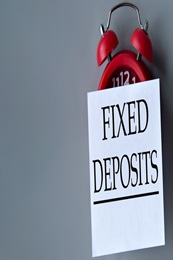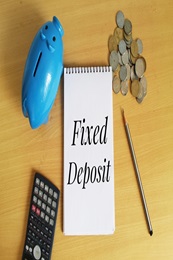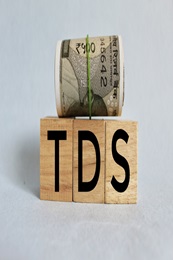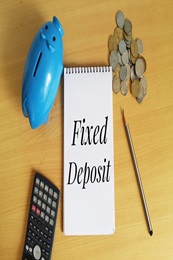How To Use Fixed Deposits For Retirement Income
April 15, 2025

As you approach retirement age, it's essential to consider ways to supplement your income and ensure a comfortable post-retirement life. One option that many people rely on is Fixed Deposits (FDs).
Fixed deposits offer a safe and reliable investment avenue that can help you generate regular income during your retirement years. In this article, we will explore the benefits of using fixed deposits for retirement income and provide valuable insights into retirement planning.
Retirement Planning Tips
The below mentioned tips can help you create a robust retirement plan, ensuring you have the financial resources to enjoy your desired lifestyle in your later years.
Start Early and Save Regularly
Starting early allows you to take advantage of the power of compounding and build a substantial retirement corpus over time. Ensure that you allocate a portion of your monthly income towards retirement savings.
Diversify Your Investments
While fixed deposits provide stability, it's crucial to diversify your retirement portfolio to maximise returns. Consider investing in other avenues such as mutual funds, stocks, or real estate to balance risk and potential growth opportunities.
Set Realistic Financial Goals
Define your retirement goals based on factors like lifestyle aspirations, healthcare expenses, inflation, etc. Assess your current financial situation and calculate how much you need to save each month to achieve those goals.
Seek Professional Guidance
Retirement planning can be complex, especially when it comes to tax implications and investment options. Consider consulting a financial advisor who specialises in retirement planning to create a comprehensive strategy tailored to your needs.
Why Include Fixed Deposits for Retirement Planning?
Fixed deposits (FDs) can be an effective strategy for supplementing retirement income, particularly for senior citizens. Here’s how they can serve as a reliable financial tool:
Guaranteed Returns
FDs provide guaranteed return on investment, which is crucial for retirees who may rely on fixed income sources. Unlike stocks or mutual funds, where returns can fluctuate, FDs offer a fixed interest rate, ensuring that retirees receive a stable income without exposure to market risks.
Higher Interest Rates
FDs offer higher interest rates compared to Savings Accounts. Senior citizens are eligible for additional interest rates, which is usually 0.5% above the regular interest rate.
Regular Income Streams
You can choose interest payout options that suit their financial needs. Banks like Ujjivan offer non-cumulative FDs that offer periodic interest pay-outs - monthly and quarterly - providing a consistent cash flow to cover daily expenses or supplement pensions. This regular income can be especially beneficial for those who no longer have a salary.
Flexibility and Management
You can select the amount you wish to invest and the tenure of the deposit, providing flexibility in financial planning. You can also choose to reinvest FDs to take advantage of compounding interest, further enhancing the income potential.
Tax Benefits
Tax Saver Fixed Deposits offer tax benefits under Section 80C of the Income Tax Act. You can claim tax deductions up to ₹1.5 lakh, as per current tax rules and regulations as on 20 October 2024. However, kindly note that tax saver FDs have a lock-in period of 5 years, meaning you cannot withdraw the amount before the stipulated time.
Security of Investment
FDs are considered one of the safest investment options, as they are insured by the Deposit Insurance and Credit Guarantee Corporation (DICGC) up to ₹5 lakh per depositor per account. This insurance provides peace of mind for retirees concerned about the safety of their capital.
FD Charges that Senior Citizens and Retirees Should Know
While investing in fixed deposits is relatively straightforward, it's essential to understand the charges associated with them. Here are some common fees and charges related to FDs:
- Premature Withdrawal Penalty: If you withdraw your FD before the maturity period, banks may charge a penalty. You would need to check with your bank on the applicable charges currently.
- TDS (Tax Deducted at Source): The interest earned on FDs is taxable at 10%. For individuals below 60 years, TDS is deducted if the interest income exceeds ₹40,000 in a financial year. For senior citizens (60 years and above), the exemption limit is raised to ₹50,000. Please note that this TDS exemption on FD interest is applicable for FY 2024-25 (till March 2025). For FY 2025-26, the current TDS exemption limit has been hiked to ₹50,000 for regular citizens and ₹1 lakh for senior citizens.
Example:
Mr. Sharma, a retired individual, is considering two fixed deposits for retirement income. Bank A offers an interest rate of 6.5% per annum for a tenure of 5 years, while Bank B offers an interest rate of 7% per annum for a tenure of 7 years. Mr. Sharma needs to calculate the maturity amount to determine which option provides better returns.
Sample Calculation:
1. Bank A FD: Principal Amount = ₹1,00,000, Interest Rate = 6.5% per annum, Tenure = 5 years
- Maturity Amount = Principal Amount + Interest Earned
- Maturity Amount = ₹1,00,000 + (₹1,00,000 @6.5% for 5-years)
- Maturity Amount = ₹1,00,000 + ₹32,500
- Maturity Amount = ₹1,32,500
2. Bank B FD: Principal Amount = ₹1,00,000, Interest Rate = 7% per annum, Tenure = 7 years
- Maturity Amount = Principal Amount + Interest Earned
- Maturity Amount = ₹1,00,000 + (₹1,00,000 @7% for 7-years)
- Maturity Amount = ₹1,00,000 + ₹49,000
- Maturity Amount = ₹1,49,000
Disclaimer: The above example is for illustration purposes only. Ujjivan Small Finance Bank doesn't take any responsibility for the accuracy of the information presented above. Kindly use an FD Calculator to check your FD returns. You can view the latest interest rates here.
Final Thoughts
In conclusion, FDs offer an excellent avenue for supplementing your income. By investing in FDs, you can enjoy regular and reliable returns while preserving the safety of your capital. Remember to incorporate FDs into your retirement planning strategy by starting early, diversifying your investments, setting realistic goals, and seeking professional guidance when needed.
Looking to grow your savings faster? Ujjivan SFB offers a wide range of fixed deposit products. Select the FD of your choice and take a step forward to your financial goals. Alternatively, you can browse through Ujjivan SFB product suite - our wide range of financial products are designed to make your financial life better.
FAQs
1. Why should seniors use fixed deposits for retirement income as an ideal choice?
Fixed deposits remains an ideal choice for seniors due to stability, higher interest rates, option to create regular income stream and liquidity benefits.
2. Can I open an FD account after retirement?
Yes, you can open a senior citizen FD account after retirement to generate regular income from your savings.
3. Can Senior Citizens open a fixed deposit online?
Yes, Senior citizens can opt for Digital Fixed Deposits, which can be opened online.
4. Are joint fixed deposit accounts available?
Yes, many banks offer joint fixed deposit accounts that allow multiple individuals to invest together and share the proceeds.
5. How can I check my FD account balance?
You can check your FD account balance through internet banking, mobile banking apps, or by visiting the bank branch.
6. What is the minimum tenure for fixed deposits?
The tenure for a regular FD ranges from 7 days to 10 years.
7. Should I submit form 15g and form 15h?
You need to submit these forms, only if your income is below the taxable limit.
Latest Blogs

Telangana Housing Board & KPHB Colony: A Guide to Affordable Urban Housing in Hyderabad
March 14, 2025
As Telangana continues its rapid urbanisation journey, two key housing entities—Telangana Housing Board (THB) and Kukatpally Housing Board Colony (KPHB)—have played critical roles in shaping the state's real estate ecosystem.

Does Checking CIBIL Score Frequently Lower Your Credit Points?
April 07, 2025
Imagine you're planning to apply for a home loan, a credit card, or even a car loan. Naturally, you want to ensure your CIBIL score is in good shape before proceeding.

Explained: Can NRIs Buy an Agricultural Land in India?
April 03, 2025
Real estate investment is often a top priority for Non-Resident Indians (NRIs) looking to retain strong financial ties to India.

How to Improve Your CIBIL Score from 600 to 750: A Step-by-Step Guide
April 02, 2025
Your CIBIL score is like your financial reputation—banks check it before approving loans or credit cards. If your score is hovering around 600, you might face difficulties in securing credit or may get loans with higher interest rates.

What Happens When You Leave Your Savings Account Unused?
April 01, 2025
Imagine waking up one day to find that your hard-earned money is locked away and inaccessible. Sounds stressful, right? This is precisely what happens when you leave your Savings Account inactive for too long.





